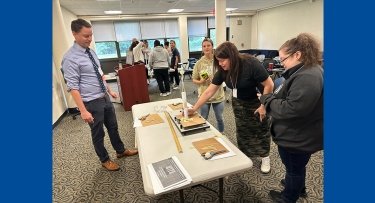Local Educators Learn, Network and Inspire at Center for STEM Education Conference

This fall, Mercy University welcomed approximately 75 educators representing 12 local school districts for the Center for STEM Education’s annual K-12 STEM Educator Conference at the Westchester Campus. Sponsored by biotechnology company Regeneron, the conference aims to help educators across the region build a network of fellow STEM educators and get new ideas about how to deliver effective STEM education that will deepen their impact with their diverse students. Since its launch in 2016, the conference has reached over 625 educators.
In the first set of sessions, attendees learned about topics such as STEM activities for the kindergarten classroom and a tower engineering project for middle and high schoolers. Then, keynote speaker Aspen Meineke, program director at The Coding Space, spoke about helping students find entry points into STEM. During a break for lunch, attendees explored the exhibitor hall to meet representatives from organizations such as the Teatown Lake Reservation and explore a poster session where teachers presented initiatives and research such as urban gardens and the history of scientific racism. Attendees were also invited to participate in a scavenger hunt to find clues and win prizes. A second set of sessions — on topics such as computer science and social-emotional learning — capped off the day.
“It's really important for educators to come together in person and establish a human connection, have those casual conversations about STEM and build a network to learn from,” said Meghan Marrero, Ed.D., co-director of the Center for STEM Education and professor of secondary science education. “And we intentionally make sure that educators are the ones presenting.”
Kimberly Whyte ’18 — a Mercy University Intensive STEM Teacher Initiative (MISTI) Scholar and high school science teacher at Charter School of Educational Excellence in Yonkers, New York — is an example of an educator who built a rich network at the conference and leveraged it to deepen her impact in her classroom. Last year at the conference, she presented on urban school gardens. She also met the director of education of the Sarah Lawrence College Center for the Urban River at Beczak and ended up bringing her students there to do a project on water chemistry and biodiversity. The Center for STEM Education helped Whyte secure grant funding to make that project possible. At this year’s conference, Whyte met the director of education at the Children’s Environmental Literacy Foundation who may be able to help her plan and fund a civic science project.
“It’s really beneficial to go to this conference,” Whyte said. “I make important connections every year. I get to see old friends and make new ones. And I get new ideas on how to improve the projects I do with students.”
Anny Vanegas — a STEM Master Teacher Fellow and a third-grade teacher at Columbus Elementary School in New Rochelle, New York — is another educator who has seen the benefits of attending the conference for years. “I really wanted to get new ideas, learn more about the pedagogy of science and be around like-minded people,” she said. “I was hungry for that. When I heard about this conference that’s right in my backyard and very affordable, I jumped at the chance to attend.”
This year, she presented on Family Learning and Outreach for Research and Education in STEM (FLORES), an initiative in which she invites her students and their families to school in the evening to participate in science experiments together. With sessions led in both Spanish and English, this initiative aims to make STEM content more accessible to underrepresented students and their families.
“The conference is such a great way to connect with others who are passionate about science,” Vanegas said. “That lights the passion in you too! You're getting ideas, you're sharing ideas, you're forming a network, you're bringing things back into your classroom — it rejuvenates you.”
Mercy’s Center for STEM Education creates opportunities for groups typically underrepresented in STEM to engage in enrichment activities for learning, career readiness, enjoyment and growth.
To learn more about the Center for STEM Education, click here.
